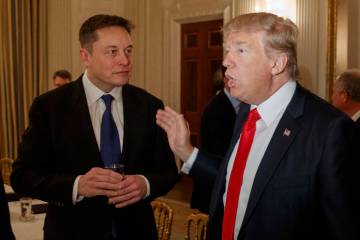EDITORIAL: President Donald Trump to move forward with infrastructure plan
We routinely hear that America’s infrastructure is deteriorating. Politicians from both parties campaign on improving the nation’s roads, airports, bridges and other public works. President Donald Trump is preparing to unveil an infrastructure spending plan next year.
Tales of woe abound. The New York Times notes that spending on government construction projects in 34 states was lower last year than in 2007, adjusted for inflation. And that trend has continued this year.
The advocacy group Transportation for America says that 31 states have enacted some form of increase in transportation funding since 2012. Clark County voters, for instance, have approved higher gasoline taxes to pay for road projects. According to the latest government data, the average road surface in the United States was 28 years old in 2015 — up from 23 years old in 2000 — and nearly one-fourth of the nation’s 611,000 bridges were either structurally deficient or functionally obsolete.
But, “truth is that, while some of our infrastructure is in poor condition, other infrastructure is in pretty good shape,” writes Randall O’Toole of the Cato Institute. That “61,000 bridges” figure? “They never mention that this number has steadily declined from nearly 138,000 in 1990 even as the number of highway bridges has grown,” Mr. O’Toole notes. “This continuing decline hardly signals a crisis.”
The Hill reports that Mr. Trump discussed the issue with key infrastructure leaders this week, and the White House says it will submit “detailed legislative principles” to Congress early next month outlining the president’s infrastructure vision. Administration officials are currently finalizing the plans, which are expected to serve as the framework for lawmakers to write actual legislation next year.
The Trump administration aims to use $200 billion in federal seed money, coupled with significant permit reform and other incentives, to leverage $1 trillion worth of overall infrastructure investment, the Hill reports. No doubt Democrats will resist any effort to involve private financiers. Funding for any plan will be contentious.
But of greater concern is the tendency for these types of bills to become larded up with unnecessary pork and make-work provisions intended to allow members of Congress to trumpet their effectiveness to the folks back home. That’s why every congressional transportation bill becomes a wasteful goody basket of porcine treats used to sate local and state voters.
By all means, let’s fix the highways and bridges in dire need of repair. But a wise plan will — to the greatest extent possible — include only targeted projects of the highest priority to ensure that limited infrastructure funds are used only in the most productive fashion possible.

















